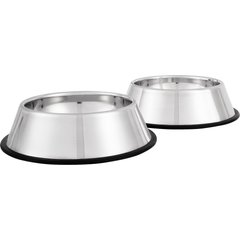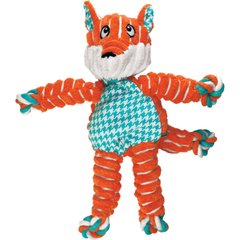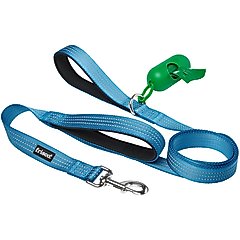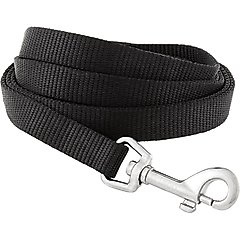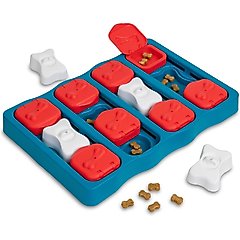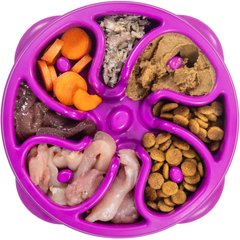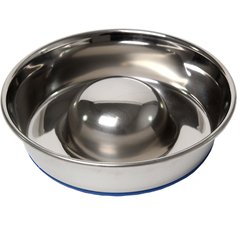Can Dogs Get Hiccups? Is This Normal?
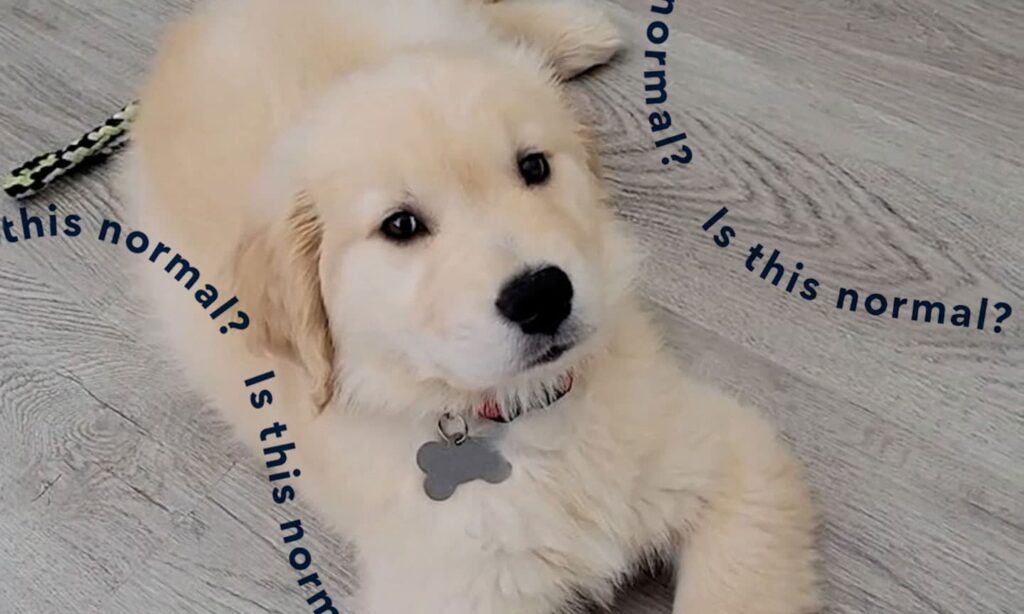
Photo by Design: Chewy Studios/Image: Courtesy of Paul Drake.
Q: My dog sounded like he had the hiccups after he drank a bunch of water. Can dogs get hiccups like we do? Is this normal?
A: Yes, similar to humans, dogs can get hiccups, too. They are generally pretty harmless, and there are various reasons they might occur, like drinking or eating too fast.
“It’s as real and natural as us humans getting them,” says Cheri Honnas, DVM, an Austin, Texas–based veterinarian.
How To Recognize Dog Hiccups
Dog and puppy hiccups sound and look a lot like human hiccups. Look for these telltale signs, according to Sarah Gorman, DVM, managing veterinarian at Small Door Veterinary in Boston:
- Rhythmic contractions or spasms of the diaphragm or abdominal area
- A slight, repetitive “hic” sound during the spasms
According to Gabre Denton, BSc, BVMS, of West Village Veterinary Hospital in New York City, “Hiccups in dogs usually clear up on their own within a few minutes, but they can sometimes stick around for 15–20 minutes.”
Why Do Dogs Get Hiccups?
Hearing a dog hiccupping is not something you may experience often, but rest assured, it is normal.
“Hiccups are caused by spasms in the diaphragm,” says Dr. Gorman. The following might result in dog hiccups:
- Eating too fast
- Getting overly excited or stressed
- Minor gastrointestinal irritation or issues
- Drinking water too quickly
- Feeling chilly
In some rare cases, dog hiccups may be linked to more severe issues, like heatstroke, which is important to keep in mind, says Dr. Honnas. If they last for a long time (more than a few hours) or are accompanied by other signs of illness, such as drooling, vomiting, or wheezing, contact your veterinarian.
Is It Hiccups or Something Else?
Sometimes, pet parents may mistake something else for hiccups and vice versa.
Hiccups vs. Respiratory Issues
It’s important to remember that hiccups are “generally restricted to the diaphragmatic region,” says Dr. Honnas, whereas respiratory issues may be more conspicuous. Signs that could indicate a respiratory complication include:
- Your dog’s hiccup-like sound progresses to a wheezing sound
- Any irregularity or difficulty in their breathing pattern
“In such cases, immediate veterinary attention is recommended to ensure the pet’s well-being,” cautions Dr. Honnas.
Hiccups vs. Reverse Sneezing
Sometimes, pet owners mistake reverse sneezing for hiccups. Reverse sneezing can sound like a hiccup or cough. It is your dog’s soft palate’s reaction to irritants, while hiccups are all about the diaphragm spasms, says Dr. Honnas. “It sounds scarier than it is, but trust me, it’s mostly benign,” she says.
Hiccups vs. Choking
A dog or puppy with hiccups will usually remain calm until the hiccups pass on their own. By contrast, says Dr. Denton, “A choking dog will tend to look very distressed.”
Additional signs of choking may include:
- Pawing at the mouth
- Drooling
- Gagging
- Coughing forcefully
Choking dogs require immediate intervention or veterinary attention (if you can’t clear the obstruction).
Do Certain Dog Breeds Get Hiccups More Than Others?
Yes, specific dog breeds may get hiccups more often than others. “Particularly, brachycephalic breeds such as Pugs and Bulldogs are more susceptible,” Dr. Honnas says.
She says the anatomy of these breeds—such as their shortened skull shapes—often leads to constricted airways. “This can increase the likelihood of hiccups,” she adds.
Do Puppies Get Hiccups?
Just like adult dogs, puppies can get a case of the hiccups, too, “and often do so more frequently than mature dogs,” adds Dr. Honnas.
While the exact reasons aren’t backed by definitive scientific evidence, she says there are a few theories. One has to do with fetal hiccups: “Some theories postulate that these hiccups in puppies might either be a carryover from their time in utero, or a mechanism to aid in digestion and alleviate gas,” she says.
Dr. Gorman says spasms within this muscle are normal and more common in puppies, therefore causing—you guessed it—puppy hiccups. “As the muscle strengthens with age, most dogs grow out of them,” she adds.
How Can You Get Rid of Dog Hiccups?
Thankfully, there are some simple expert-recommended ways to help get rid of dog hiccups:
- Wait it out. Most cases of hiccups in dogs go away on their own. If they last longer than 20 minutes or bother your dog, try something to soothe their throat or distract them.
- Offer a small amount of water. “Offering lukewarm water and having your dog drink at a slow, calm rate,” says Dr. Denton, “can help with your dog’s hiccups by relaxing their diaphragm.” Adding a little honey to your dog’s water bowl can soothe the throat and flavor the water to encourage your dog to drink.
Recommended Product
- Distract your pup with a dog toy. A gentle play session can help relieve dog and puppy hiccups by shifting their focus and encouraging deeper breathing. “Having fun can also ease any stress or excitement that might be causing the hiccups,” Dr. Denton says.
Recommended Products
- Take your dog on a mellow walk. A short leashed walk can be an effective distraction if your dog doesn’t want to play. “This extra activity relaxes the diaphragm,” adds Dr. Denton, “and breaks the hiccup cycle.”
Recommended Products
- Give your dog a gentle tummy rub. A gentle belly rub may also help relax your dog’s diaphragm. It’s also a great way to comfort your dog if they’re becoming distressed by the hiccups.
How Can You Prevent Dog Hiccups?
Eating and drinking too fast are common reasons dogs get hiccups. You can do the following expert-recommended things during mealtime to help prevent them:
- Use dog puzzle toys or slow-feeder dog bowls at mealtime.
Recommended Products
- Offer smaller portions of dog food at a time.
- Give your dog smaller amounts of water at a time.
What if Dog Hiccups Don’t Go Away?
In general, dog hiccups shouldn’t be a big deal and often resolve on their own. However, if any of the below occurs, Dr. Gorman recommends bringing your dog into the vet to get checked because they may be linked to an underlying medical issue.
- Hiccups persist for an extended period, such as longer than several hours
- Hiccups become more frequent or severe
- Your dog shows signs of distress or discomfort
“If hiccups aren’t packing their bags and leaving, it might be time to dial your vet,” Dr. Honnas adds. “It’s better to be safe than sorry.”
FAQs About Dog Hiccups
How do I know if my dog has hiccups or is choking?
Hiccups may briefly interrupt your dog’s breathing but won’t completely obstruct it. If your dog is struggling to breathe, pawing at their mouth, gagging, or coughing, they may be choking.
What does a dog with hiccups look like?
In a dog or puppy, hiccups look like brief and rhythmic contractions or spasms in the chest or abdomen. They may also be accompanied by a repetitive “hic” sound.
What can be mistaken for hiccups in dogs?
Most of the reasons dogs get hiccups are harmless. However, serious problems like respiratory issues, reverse sneezing, retching, and choking can sometimes be mistaken for dog hiccups.
